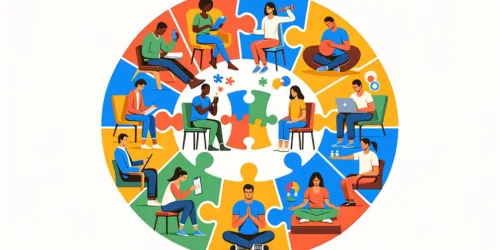Discover Powerful Coping Skills for All Ages
Feeling like you can handle life's challenges all on your own? You might be thinking that you don't need any help when it comes to coping with stress or difficult situations. But here's the thing – nobody is immune to the pressures of life, and everyone can benefit from learning powerful coping skills.
In this article, you'll uncover a variety of techniques that can be used by individuals of all ages to navigate through life's ups and downs. From managing your emotions to finding inner peace, these coping strategies will equip you with the tools you need.
So, are you ready to discover the secrets to handling life with grace and resilience?
Key Takeaways
- Engaging in creative activities such as writing, drawing, or painting can be an effective coping skill for people of all ages.
- Taking care of one's physical health through activities like exercise, getting enough sleep, and eating healthy foods is important for coping with stress.
- Seeking social support and spending time with friends and family can help individuals cope with difficult situations.
- Developing a spiritual practice, such as prayer or meditation, can provide a sense of peace and help individuals cope with stress and challenges.
General Coping Skills
When you're faced with challenging situations, having a set of general coping skills can be incredibly helpful in managing your emotions and finding a sense of balance. Coping skills for stress and anxiety are essential tools that can support you through difficult times.
Engaging in creative activities like writing, drawing, or painting can provide a much-needed outlet for self-expression. Playing a musical instrument, singing, dancing, or acting can help release tension and uplift your mood.
Taking a shower or bath can offer a soothing and refreshing experience. Gardening and spending time in nature can provide a sense of tranquility and connection. Taking a walk or going for a drive can give you a change of scenery and help clear your mind.
Watching television or a movie can be a form of escapism and relaxation. Watching cute kitten videos on YouTube can bring a smile to your face and lighten your mood. Playing a game can provide a distraction and engage your mind.
Going shopping can be a way to treat yourself and find enjoyment in the present moment. Cleaning or organizing your environment can create a sense of order and control.
These coping skills for stress and anxiety are just a few examples of how you can navigate challenging situations with resilience and find inner peace.
Social/Interpersonal Coping

To effectively cope with social and interpersonal challenges, it's important to develop and utilize healthy communication skills and establish meaningful connections with others. Here are some strategies to help you navigate these situations:
- Set boundaries: Clearly communicate your limits and expectations to others in order to maintain your well-being and protect your personal space.
- Build healthy relationships: Invest time and effort in nurturing relationships that are based on trust, respect, and mutual support. Surround yourself with people who uplift and encourage you.
- Seek support: Reach out to someone you trust, such as a friend or family member, and share your thoughts and feelings with them. Talking to someone can provide comfort and perspective.
- Practice active listening: Show genuine interest in others by listening attentively and validating their experiences. This can strengthen your relationships and foster understanding.
- Be assertive: Express your thoughts, opinions, and needs in a clear and respectful manner. Assertiveness can help you navigate conflicts and maintain healthy relationships.
Cognitive Coping

Cognitive coping involves utilizing strategies to manage and shift your thoughts and perspectives in order to navigate challenging situations more effectively. By actively engaging your mind, you can gain better control over your emotions and reactions. Here are some cognitive coping strategies that can help you:
| Cognitive Coping Strategies | Benefits of Cognitive Coping |
|---|---|
| Challenge negative thoughts | Promotes positive thinking and reduces anxiety |
| Practice reframing | Helps you see situations from a different perspective |
| Use positive affirmations | Boosts self-confidence and promotes a positive mindset |
| Engage in problem-solving | Encourages proactive behavior and reduces stress |
| Practice mindfulness | Increases present-moment awareness and reduces rumination |
Tension Releasers

Now let's explore a different aspect of coping strategies: tension releasers. When you're feeling overwhelmed or stressed, it's important to find healthy ways to release that tension.
Here are some catharsis techniques and emotional release strategies that can help:
- Engage in physical activity: Exercise or play sports to get your body moving and release pent-up energy.
- Practice catharsis: Find a safe space to yell, scream, or punch a punching bag to let out your frustrations.
- Allow yourself to cry: Shedding tears can be a powerful way to release emotions and provide relief.
- Seek laughter: Watch a funny movie, read a humorous book, or spend time with people who make you laugh.
- Find a creative outlet: Engage in activities like writing, drawing, or playing music to express your emotions.
Physical Coping

When you're looking for ways to physically cope with stress and overwhelm, there are several strategies that can help you find relief.
Engaging in self-care activities is crucial for maintaining your physical well-being. One effective way to cope physically is to prioritize getting enough sleep. A good night's rest can rejuvenate your body and help you feel more energized to face the challenges of the day.
Additionally, eating healthy foods is essential for nourishing your body and promoting overall well-being. Incorporating a balanced diet rich in nutrients can provide you with the physical strength and stamina needed to manage stress.
Establishing a good routine can also contribute to your physical coping. This includes setting aside time for exercise or physical activity, which is known to release endorphins and reduce stress.
Spiritual Coping

To continue finding effective ways to cope with stress and overwhelm, let's explore the subtopic of 'Spiritual Coping' and discover how it can provide you with inner strength and peace.
Connecting with nature can be a powerful spiritual coping mechanism. Spending time outdoors, whether it's going for a walk in the park, hiking in the mountains, or simply sitting in your backyard, allows you to connect with the beauty and tranquility of the natural world. It can help you find solace and a sense of calm amidst the chaos of daily life.
Finding inner peace is another aspect of spiritual coping. Engaging in practices such as prayer or meditation can help quiet your mind and bring a sense of serenity. It allows you to detach from the stresses of life and find a deeper connection with your inner self.
Frequently Asked Questions
How Can Coping Skills Be Helpful in Managing Stress and Difficult Emotions?
Coping skills are helpful in managing stress and difficult emotions by providing healthy ways to deal with them. Engage in activities like writing, drawing, or talking to someone you trust. These skills can empower you to navigate challenging situations with resilience and self-care.
Are There Any Coping Skills That Can Be Used in a Crisis or Emergency Situation?
In a crisis or emergency, it's crucial to have coping skills. Stay calm, breathe deeply, and focus on what you can control. Use problem-solving techniques, seek support, and prioritize your safety. Remember, you're resilient and capable of handling anything.
Can Coping Skills Be Effective in Reducing Anxiety and Panic Attacks?
Coping skills can be very effective in reducing anxiety and panic attacks. They provide tools to manage difficult emotions and promote mental health and well-being. Practice coping skills to find what works best for you.
What Are Some Coping Skills That Can Be Used to Improve Self-Esteem and Self-Confidence?
You can improve your self-esteem and self-confidence through coping skills. Try engaging in activities that make you feel good about yourself, setting boundaries, talking to someone you trust, and practicing self-care.
Are There Any Coping Skills Specifically Designed for Children and Adolescents?
There are coping skills specifically designed for children and adolescents. Effective strategies for crisis situations include deep breathing, journaling, talking to a trusted adult, and engaging in creative activities like drawing or playing music.
Conclusion
In conclusion, this article has provided you with a treasure trove of coping skills that can help you navigate life's challenges.
By exploring various techniques, such as engaging in creative activities and practicing relaxation, you can find inner peace and manage your emotions effectively.
Remember, no matter what you're facing, these tools are here to empower you and guide you towards personal growth.
So, embrace the power within you and face life's ups and downs with confidence and resilience.






